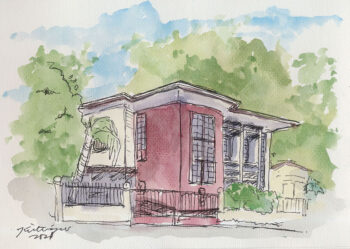MALAYBALAY CITY (MindaNews/22 July) – Time was when Cagayan de Oro City was a hot item to the national media not least because it’s the home of some of the country’s colorful politicians. The names of three lawyers easily come to mind: Reuben Canoy, Aquilino Pimentel Jr. and Homobono Adaza.
Canoy and Pimentel became city mayors. Adaza became a governor of Misamis Oriental. All three had served as members of the Marcos-era Batasan Pambansa. Another one thing they had in common was their being outspoken critics of the Martial Law regime, although their differences would soon surface.
It was Canoy who first hogged the national limelight when he emerged as the lone opposition candidate in Northern Mindanao (Region 10) to win in the 1978 Batasan polls in what observers said was a “consuelo de bobo” from the dictatorship because he landed on the last spot. At that time, Batasan members were elected on a regional basis.
But for whatever reason, Canoy failed to sustain his image as a debonair anti-Marcos figure. His star quickly dimmed, and in the years after his stint at the Batasan the only sign of life – a faint one – from a once promising political career was his occasional speaking engagements and early morning radio program “Perspective” over Radio Mindanao Network. He also wrote a book on Martial Law, “The Counterfeit Revolution”, no doubt a diatribe against the “Revolution from the Center”, which Marcos touted as the ideological foundation of his authoritarian rule.
Pimentel on the other hand opted to run for Cagayan de Oro’s lone seat at the Batasan, in 1984, even while he was still mayor, and while he was in detention for allegedly giving financial support to the New People’s Army. He won against former city mayor Pedro Roa, a rich businessman who made his fortune in logging. Roa’s camp claimed that Pimentel cheated, but the election case he filed was never resolved until it was overtaken by the Edsa uprising.
Like Pimentel, Adaza, who was still governor of Misamis Oriental, ran for assemblyman of the province’s lone seat and won. He had sought to retain his post as governor, citing the case of Estelito Mendoza who aside from being governor of Bulacan was also the solicitor general and an appointed assemblyman. As expected however the Supreme Court thumbed down his petition.
And so it came to pass that Adaza and Pimentel tried to build their political stock on the national level, each one clinging to a different bloc. Adaza, viewed by the Left as more progressive than Pimentel, ironically cast his lot with the conservative Salvador Laurel, a former senator whose presidential ambition was no secret.
Pimentel would eventually support Corazon C. Aquino when the time came for the opposition to choose a single candidate against Marcos in the 1986 snap presidential and vice presidential elections.
It’s been said that the event was a defining moment for Laurel, who yielded to Aquino for the sake of a united front against Marcos. But it also defined the three politicians and their future.
Canoy ran for president in what some would dismiss as Marcos’ desperate, if comical, attempt at dividing the votes for the opposition. If it was really Marcos who told Canoy to run, then it must be true that lupus makes a person lose touch with reality. Canoy was anything but a serious contender.
Having stuck to Laurel, Adaza found himself marginalized after Edsa, while Pimentel enjoyed the privileges of having sided with Aquino.
In 1987, Pimentel ran for senator under the ruling coalition and won. Adaza ran under the Grand Alliance for Democracy led by former defense minister Juan Ponce Enrile. Only Enrile and Joseph Estrada won from the opposition.
Adaza’s political career has had never recovered. If he has occasionally managed to be in the spotlight, it’s mainly because he has taken up unpopular causes, particularly defending coup plotters.
Meanwhile, in their absence from local politics, another figure from a small town in Misamis Oriental called Tagoloan sneaked in. With his inimitable guttural voice and suave ways, he somehow managed to beguile the city’s once discerning but now masochist voters. But regardless of his political feat he is nothing more than a clown in a tragi-comedy.
Cagayan de Oro prides itself as the city of gold. But the uninterrupted rule of this comedian has made the city live up to the original, legend-inspired meaning of its name as the place of eternal shame. (MindaViews is the opinion section of MindaNews. H. Marcos C. Mordeno can be reached at hmcmordeno@gmail.com)







